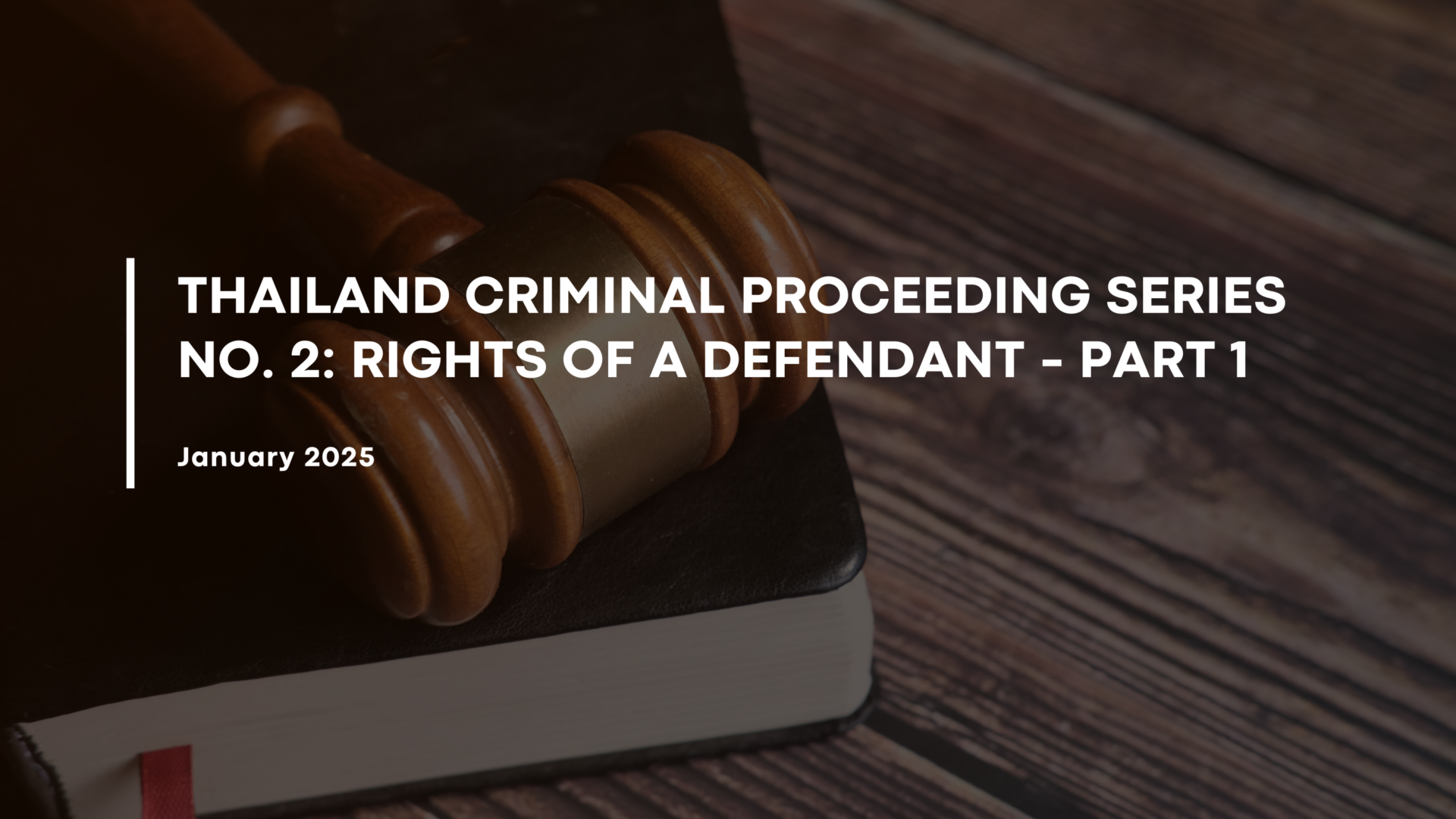Thailand Criminal Proceedings Series No.2: Rights of a Defendant Part 1
20 January 2025
The Constitution of Thailand and more specifically the Criminal Procedure Code guarantees basic rights for all persons, where they shall be presumed innocent until proven guilty. This principle, which is widely adopted in many parts of the world, is one that guarantees that before a judgment is passed in the courts of law, no person shall be treated and considered guilty. The potential suspects are however, still subject to legal proceedings as part of the investigation and legal process with respect to the offense. This means that potential suspects, with sufficient initial evidence, may still be subject to detainment and official custody. In other words, these accused may be considered as suspects who are accused of committing an offense, even though they have not yet been formally convicted and sentenced with respect to that offense.
To guarantee the fundamental rights and freedoms of individuals in the criminal justice process, the Constitution of the Kingdom of Thailand and the Criminal Procedure Code has provisions that ensure due process of the law and related legal proceedings so that no person shall be unjustly prosecuted or treated before being convicted by the courts of law.
The Right to be presumed innocent until proven guilty, and before a final judgment is rendered, no one shall be treated as guilty (Constitution, Section 39)
When someone is accused of a crime, they are presumed innocent from the outset. This means that they should be treated as if they are not guilty until their guilt is proven beyond a reasonable doubt in a court of law. Such responsibility to prove the accused person’s guilt lies with the prosecution. In other words, the accused does not have to prove their innocence, but the prosecution must present sufficient evidence to establish guilt beyond a reasonable doubt until a final judgment is rendered by a court. Due to the presumption of innocence, the accused must be treated fairly and with respect throughout the process and should not be subject to prejudicial treatment based on the accusation alone.
The Right to a prompt, continuous, and fair investigation or trial (Constitution, Section 40 (3)(4)(7); Criminal Procedure Code, Sections 130, 134, third paragraph)
Another principle in Thai criminal law is that every person is entitled to a fair and prompt legal process. To ensure the rights of the accused are respected throughout the legal proceedings, investigations and trials should be conducted without unnecessary delays and should follow due process of law. This means that the investigations should be thorough and conducted promptly, and trials should be continuous and fair, ensuring that all parties have a reasonable opportunity to present their case.
The Right to state-provided legal assistance (Constitution, Section 40(7); Criminal Procedure Code, Section 134/1)
In criminal proceedings, a defendant has the right to legal assistance. This means that the state is obligated to provide legal aid to criminal defendants who cannot afford a lawyer. This provision helps ensure that all individuals, regardless of their financial situation, have access to legal representation and a fair trial. This provision further ensures that individuals are informed of their right to legal aid and that qualified legal representatives are made available to those in need during criminal proceedings.
The Right not to self-incriminate (Constitution, Section 40(4))
The right not to self-incriminate is a fundamental legal principle that protects individuals from being forced to provide testimony or evidence that could be used against them in a criminal case. This right ensures that a person cannot be compelled to confess to a crime or provide information that would lead to their own conviction. This right also helps to ensure fairness in the legal process, preventing authorities from using coercion or pressure to obtain confessions or admissions of guilt. It also upholds the principle that the burden of proof lies with the prosecution.
The Right to be released if unlawfully detained (Criminal Procedure Code, Section 90)
The right to be released if unlawfully detained ensures that individuals cannot be held by authorities without a lawful basis. If a person is detained or imprisoned without proper legal justification, they have the right to challenge their detention and seek release. In practice, this right is often protected through legal mechanisms such as habeas corpus, which allows a detained person to appear before a court to review the legality of their detention. If the court finds that the detention is unlawful, it can order the individual’s release. This right is crucial for protecting personal freedom and preventing abuse of power by authorities. It ensures that no one can be detained arbitrarily or without due process of law.
The Right to prompt consideration of bail requests in criminal cases, without excessive bail requirements, and to be informed of the reasons for denial (Constitution, Section 40(7); Criminal Procedure Code, Sections 106 to 114)
This right ensures that individuals accused of a crime are given a fair and timely opportunity to request bail, which is a form of temporary release while awaiting trial. When a person requests bail, the court must review and decide on the request without undue delay. This helps prevent prolonged and unnecessary detention of the accused while awaiting trial. The amount of bail set by the court should be reasonable and not more than necessary to ensure that the accused will appear for their trial. Excessive bail could unfairly keep someone in jail simply because they cannot afford to pay. If bail is denied, the court must provide clear reasons for the decision. This transparency ensures that the accused understands why they are not being granted bail and can address any issues or concerns if they seek to appeal the decision.
The Right to appeal against bail denial (Criminal Procedure Code, Section 119 bis)
If the accused’s request for bail was denied, he not only has the right to know the reasons why his bail was denied, he also has the legal right to appeal the decision in a higher court. This right to appeal against bail denial is a crucial aspect of the legal system, as it helps prevent potential injustices and ensures that individuals have multiple opportunities to seek a fair determination regarding their release while awaiting trial.
The Right to an interpreter or sign language interpreter if the accused cannot speak or understand Thai, or cannot speak, hear, or communicate (Criminal Procedure Code, Sections 13, second and third paragraphs)
The right to an interpreter or sign language interpreter ensures that individuals who are involved in legal proceedings and cannot speak or understand Thai, or cannot speak, hear, or communicate, are provided with the necessary support to fully participate in their defence. If the accused does not understand Thai, they have the right to an interpreter who can translate the proceedings into a language they understand. This ensures that the accused are fully aware of the charges against them, the evidence presented, and the legal arguments made. This right is fundamental to ensuring a fair trial as it prevents any disadvantage that the accused might face due to language barriers or communication impairments and upholds the principle of equality before the law.
Conclusion
In conclusion, in criminal cases there are some fundamental rights that are guaranteed by the Thai Constitution and Criminal Procedure Code. Most importantly, the accused is presumed innocent until proven guilty by a final judgment. This fundamental principle ensures that no individual is treated as guilty before a court renders its decision. Based on this fundamental principle, the Thai Constitution and Criminal Procedure Code provides various rights to protect individuals throughout the criminal justice process, namely, the right to a prompt trial, the right to representation, the right to be released if unlawfully detained, the right not to self-incriminate, and the rights regarding bail, among other things.
This article is part of a short series on the Considerations of Criminal Proceedings in Thailand, where we will continue to explore the nits and bits that are key to a successful trial strategy.
© PDLegal LLC
This article is intended to provide general information only and does not constitute legal advice. It should not be used as a substitute for professional legal consultation. We recommend seeking legal advice before making any decisions based on the information available in this article. PDLegal fully disclaims responsibility for any loss or damage which may result from relying on this article.
Further information
Should you have any questions on how this article may affect you or your business, please get in touch with the following persons:
Contributed by:
Paul Papon Charoenpao
Managing Partner PDLegal ThailandChambers & Partners – Asia Pacific 2023
PDLegal LLC is pleased to announce that Managing Partner, Peter Doraisamy, has been recognised and ranked by Chambers & Partners (Asia Pacific 2023 for Shipping: Domestic: Litigation). The following quotes appear with Peter’s ranking: –
“Peter Doraisamy of PDLegal in Singapore is a noted shipping lawyer in the market. He handles a wide range of disputes, including ship grounding, cargo and fraud-related cases” – Chambers & Partners – Asia Pacific 2023
“He is excellent in litigation. He has very good control of the case, collecting the right evidence and putting this into a very successful trial.” – Shipping Litigation Client
Chambers and Partners is the leading independent professional legal research company operating across 200 jurisdictions. Chambers and Partners delivers detailed rankings and insights into the world’s leading lawyers and law firms.
This ranking is a testimony to the expertise and experience of the Firm’s shipping practice and would not be possible without the support of our clients and friends.
View All Awards

We’re here to help you.
Whether you're seeking advice, representation, or have general inquiries, we're here to help. if you would like to speak to us for more information, please contact our client services team who will be happy to assist.
Let's Get In Touch
Our Office
- A:
PDLegal LLC Advocates & Solicitors 1 Coleman Street #08-02 The Adelphi Singapore 179803
- E:
- T:
- F:
(65) 6220 0392
- H:
Mon - Fri : 9:00 am - 5:00 pm Sat : 8:30 am - 12:00 pm










